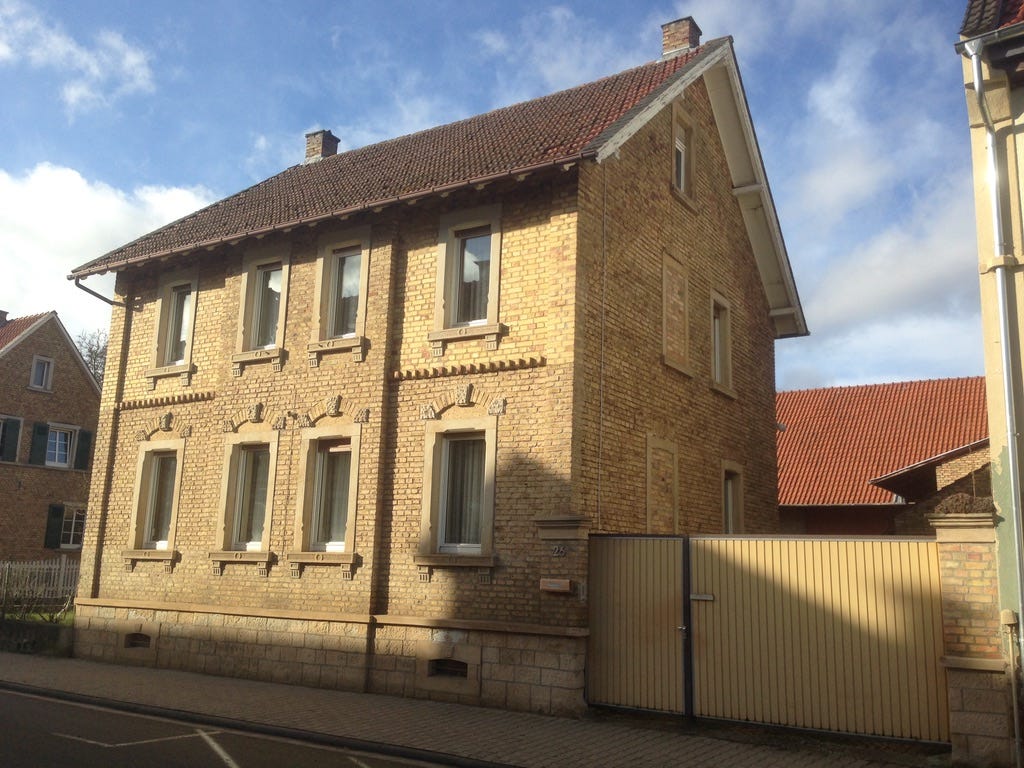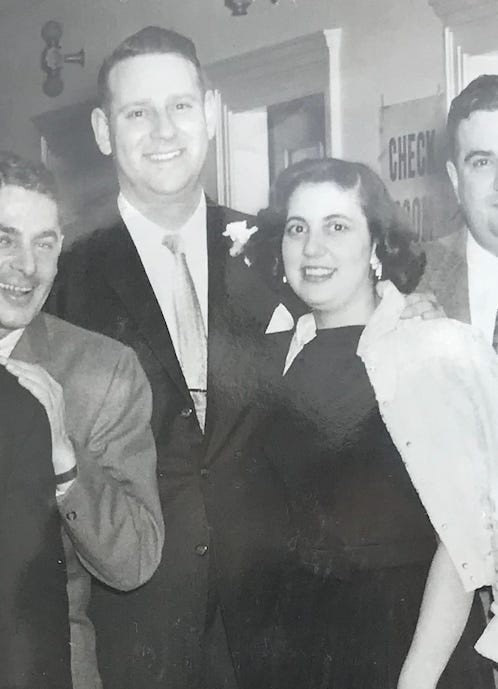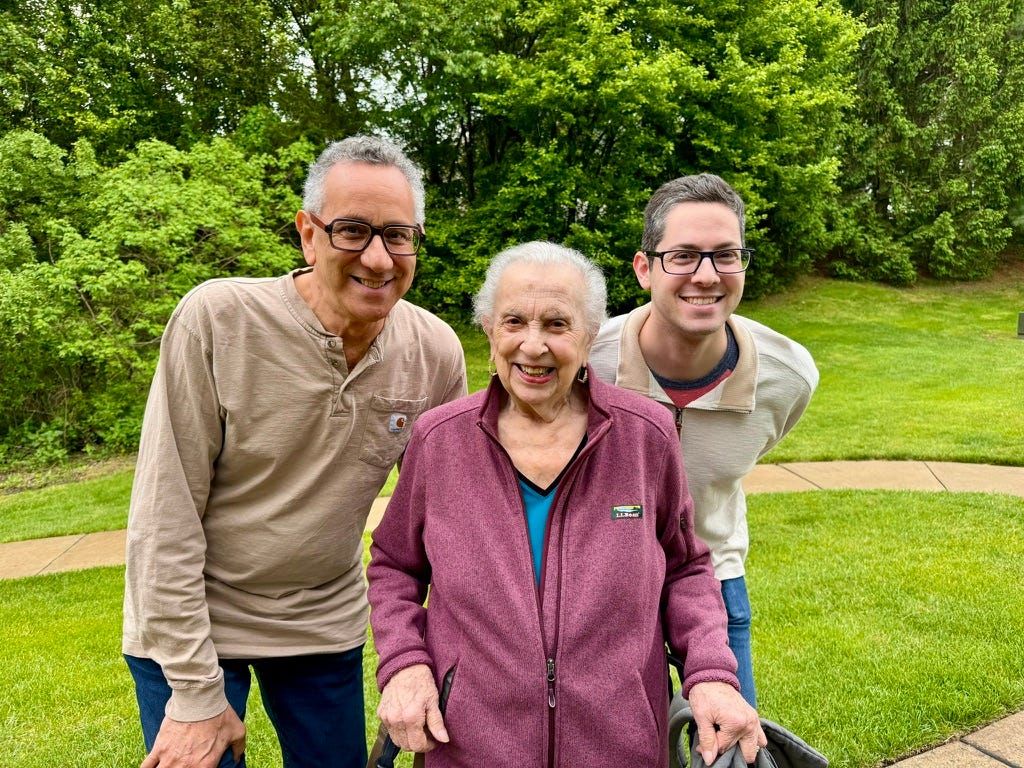How did you get to where you are in business? And why does it matter?
The past is prologue – and helps you keep your eye on the ball
I wanted to take this week’s newsletter and tell you the story of how my family got to where we are in business. Not because I want to talk about myself, but because I think it helps shed some light on why our businesses run the way they do, and why I view leadership and management the way I do.
My family started in business in 1954 – but, as is typical, my grandparents had only been in this country for just over a decade. My paternal grandmother was born in the 1930s in Germany, in a tiny town called Gau Bickelheim, current population 2,100.1 One of just three Jewish families in the town at the time, my grandmother was eight years old when the school principal called her parents into his office and advised them dejectedly that, with the Nazi regime coming to power and beginning to execute their vision for Germany, he would be unable to protect their daughter if anything were to happen. He advised them to take measures into their own hands.
Knowing what that meant, they packed up their belongings and, long story short, ended up on a boat to America, settling in Connecticut before ending up in a small farming town in New Jersey called Vineland.
My paternal grandfather had a similar, if not more frightening backstory. He was born in Vienna, Austria to a father who had a PhD and a prominent job as the editor of the local newspaper. While walking through the park with his parents one day, a group of Nazi soldiers appeared and demanded that all Jews identify themselves and line up. As they began marching through the city, a townsperson recognized my great grandfather, pulled him and his family out of line, and with urgency in his voice, told them to get their belongings and get out. They packed what they could, bounced around Europe for close to a year while attempting to secure passage to the United States, and eventually found their way to Vineland as well.
Both families struggled to make ends meet in America, as do most immigrants. But in the 1950s, my grandparents met, began dating, and eventually were married. My grandfather worked as a CPA, while my grandmother worked in her synagogue’s office.
One of my grandfather’s hobbies was philately, or stamp collecting. As he traveled the region visiting his various clients, he would bring along some of his collections to share with them. Those that were interested would purchase some of his excess collection, leaving him with some spending money on top of his wages.
After quite a while, he realized that he was making nearly as much money selling pieces of his stamp collection as he was doing his actual job. He and my grandmother decided it was an opportunity, and in 1954 they decided to start their first business, a hobby distributor that sold to local retail stores. The business started in the basement of their home, before expanding so rapidly that they were forced to find a commercial location in a nearby town.
They took on a business partner (my grandfather’s college roommate), and the business continued to progress nicely. My father, born in the late 1950s, had been interested in the business from a young age.2 As he entered high school, he began working as many hours as he could to learn the business, expecting to take over from his dad one day. But when problems arose between my grandfather and his business partner, the family decided to sell their share and start another, similar business. In 1976, they did just that (also in the basement of their next home).
But with a two-year non-compete clause in their contract, they were unable to sell certain products to any of their existing customers in the region. It forced them to do two things: first, they had to find a customer base outside of the Philadelphia region. Second, they had to seek out products that were not restricted so that they could cultivate the relationships with their existing customers. Both turned out to be crucial foundations for an explosive business model.
The family began importing products from around the world, as well as buying items made domestically, and developed a customer list that was national, not just in the tri-state area. They outgrew their basement operation, requiring another search for a commercial location to house their expanding vision. They wanted more warehouse space, a full office, and a daily pickup from the delivery carrier. Perhaps it was just too much to ask of my grandmother to lug boxes to and from the post office each day?3 Either way, my grandmother found a suitable building and the move was completed in late 1981.
Incredibly long story short, that business continued to expand over the years. In the 1990s, my father slowly took over from my grandfather, who scaled back his hours before passing away in 2008. I joined full-time after I graduated college after working multiple summers in the company growing up. Currently my father is in the process of scaling back his hours as his dad was years ago, thereby handing the reins of the family business to the third generation – an extraordinary achievement for any company.
While admittedly light on some of the details here (because it could last another 5,000 words), what I want to get across is that through three generations, we’ve never forgotten that immigrant mindset. My father and I have never known any other country as home, but we understand the pain, sacrifice, and struggles that my grandparents went through to get to where they did. Businesses grow, numbers get larger, but the ethics and morals always have to remain the same if you want to continue that success. My grandparents were extremely successful, but continued to live modestly their entire lives. That same mindset permeates our business each day. You can’t get too big for your britches, no matter how well you’re doing. It can all come crashing down if you’re not careful.
You cannot run a business the same way forever and expect to last, but you can remember where you came from, remember the grit involved in making it successful, and adjust those mindsets for the present day. The reason multi-generational businesses often fail is because the second or third generations don’t understand the mindset necessary to make a business work. It’s a lesson I recall every day, knowing that you cannot just sit back and assume success will come to you. We’ve used that gritty mindset to expand our business drastically over the years, in a way my grandfather likely would never have even imagined.
Each of us has a story behind why and how we’re in business. Not all of them involve narrowly escaping a religious genocide, but all of them help shape who we are and why we operate the way we do. I often reflect on our family’s history to ground myself as a reminder of what is required to succeed. I know my grandmother (who is still with us!) is proud of what the family businesses have become, and I’m sure my grandfather would be as well.
And that building my grandmother found over 40 years ago? We’re still there. We’ve expanded the building three times over the years and are still short on space, but we make do with what we have (as every small business owner knows). There’s no time to complain – we have businesses to run.
We actually visited Gau Bickelheim with her in 2014, one of the most memorable days of my life. To watch her go back to her childhood home, explore the streets as she had 80 years earlier, and even link up with one of her long lost childhood playmates, was really something.
Well, the staff said he mostly got in the way, but to be fair he was like eight years old at the time.
Though, in an act that can only be described as precisely on brand, my grandfather decided to be a romantic and bought my grandmother a new hand truck for Mother’s Day so she could transport more packages at one time. Watch out, ladies!





